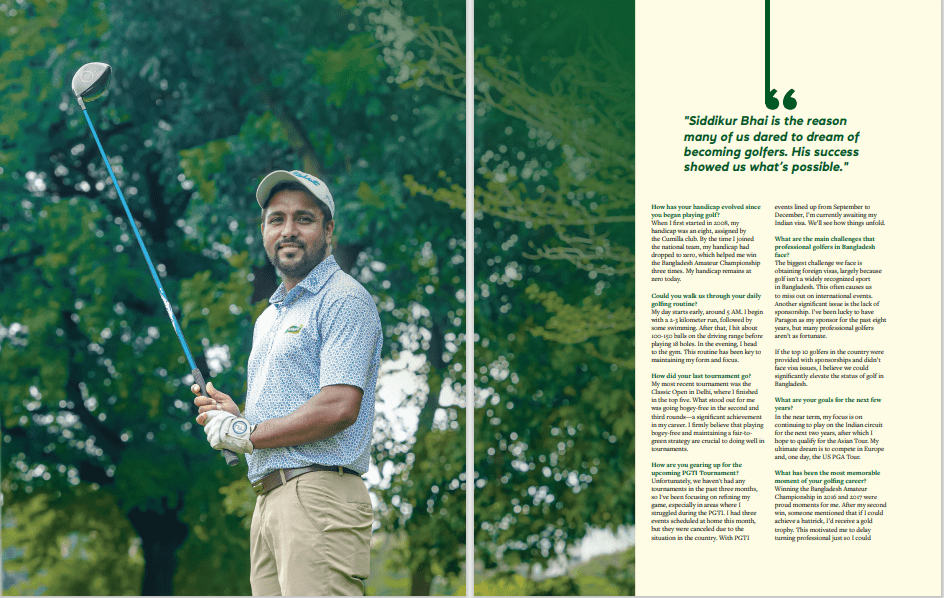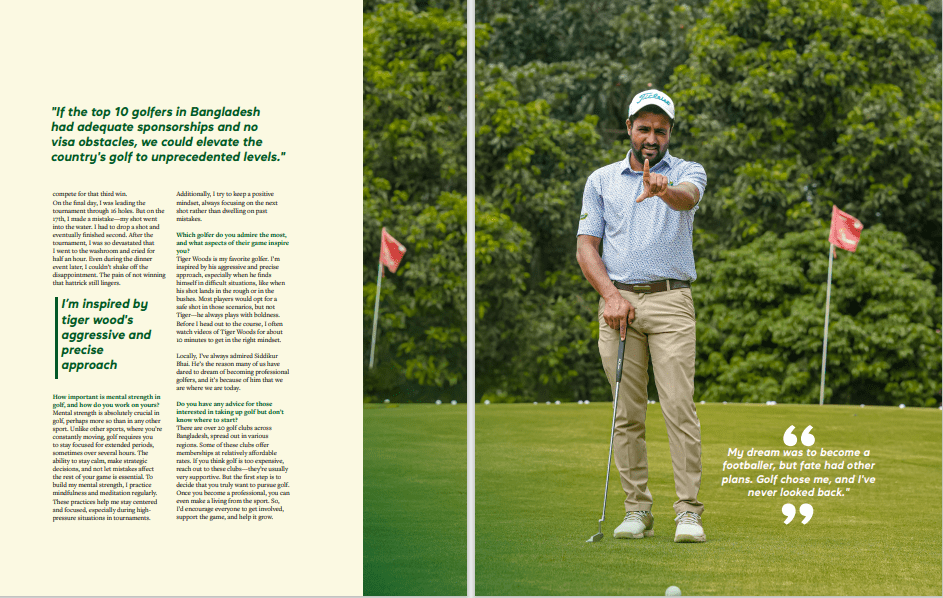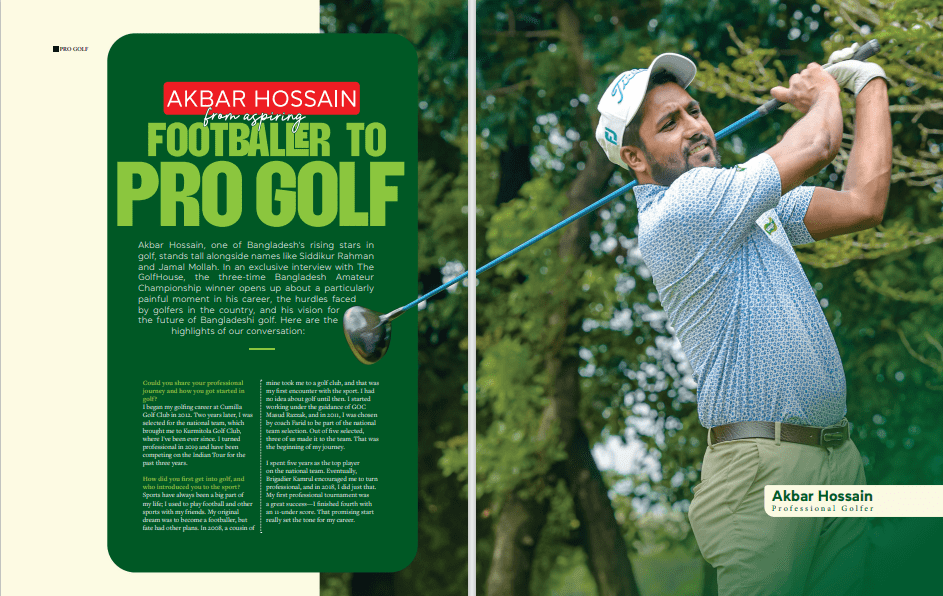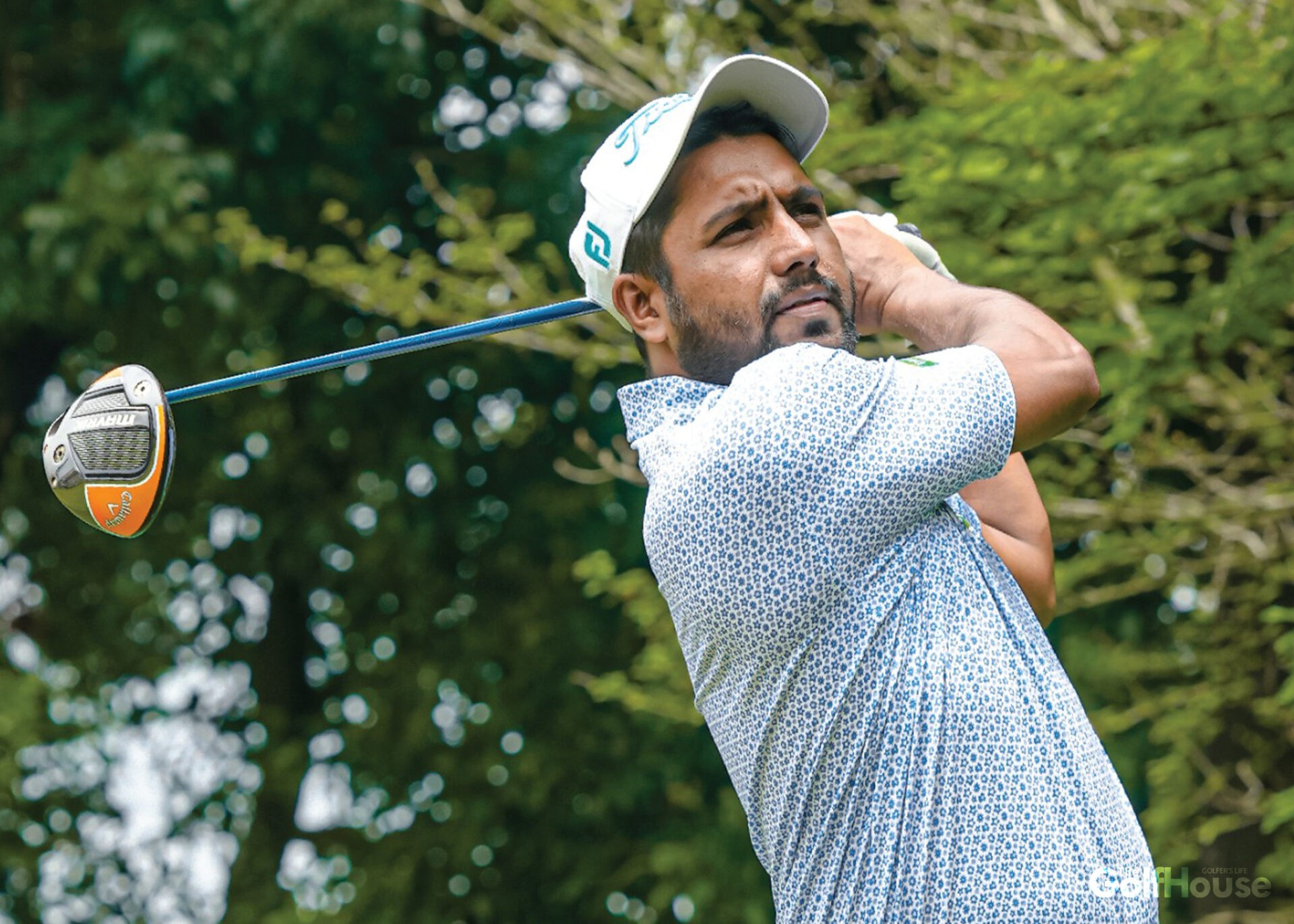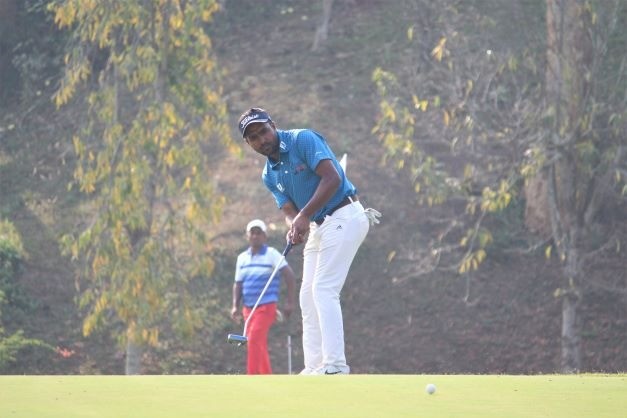AKBAR HOSSAIN FROM ASPIRING FOOTBALLER TO GOLF PRO
“My dream was to become a footballer, but fate had other plans. Golf chose me, and I’ve never looked back.” – Akbar Hossain Pro Golfer
Akbar Hossain, one of Bangladesh’s rising stars in golf, stands tall alongside names like Siddikur Rahman and Jamal Mollah. In an exclusive interview with TheGolfHouse, the three-time Bangladesh Amateur Championship winner opens up about a particularly painful moment in his career, the hurdles faced by golfers in the country, and his vision for the future of Bangladeshi golf. Here are the highlights of our conversation
Could you share your professional journey and how you got started in golf?
I began my golfing career at Cumilla Golf Club in 2012. Two years later, I was selected for the national team, which brought me to Kurmitola Golf Club, where I’ve been ever since. I turned professional in 2019 and have been competing on the Indian Tour for the past three years.
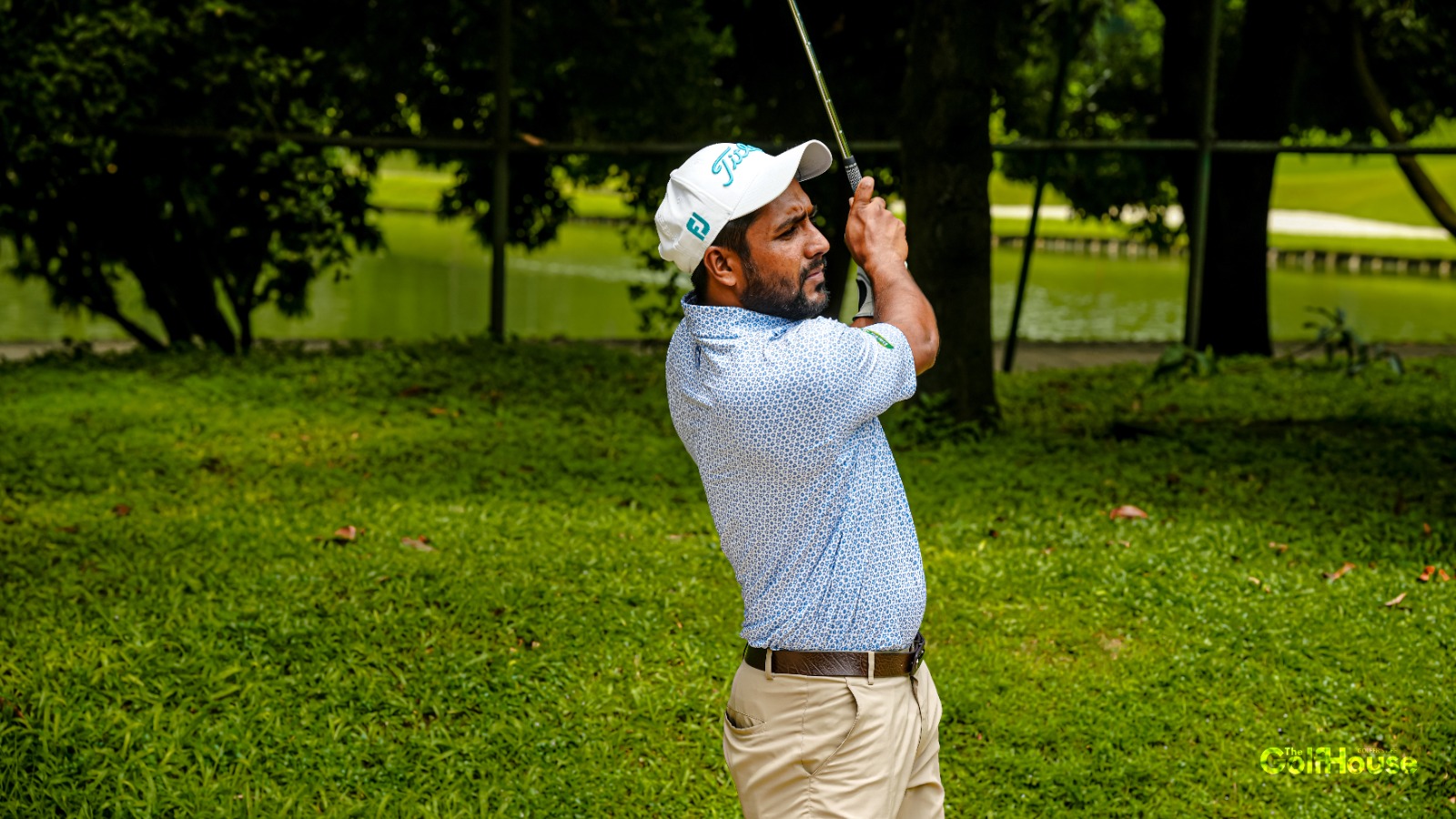
How did you first get into golf, and who introduced you to the sport?
Sports have always been a big part of my life; I used to play football and other sports with my friends. My original dream was to become a footballer, but fate had other plans. In 2008, a cousin of mine took me to a golf club, and that was my first encounter with the sport. I had no idea about golf until then. I started working under the guidance of GOC Masud Razzak, and in 2011, I was chosen by coach Farid to be part of the national team selection. Out of five selected, three of us made it to the team. That was the beginning of my journey.

I spent five years as the top player on the national team. Eventually, Brigadier Kamrul encouraged me to turn professional, and in 2018, I did just that. My first professional tournament was a great success, I finished fourth with an 11-under score. That promising start really set the tone for my career.
How has your handicap evolved since you began playing golf?
When I first started in 2008, my handicap was an eight, assigned by the Cumilla club. By the time I joined the national team, my handicap had dropped to zero, which helped me win the Bangladesh Amateur Championship three times. My handicap remains at zero today.
Could you walk us through your daily golfing routine?
My day starts early, around 5 AM. I begin with a 2-3 kilometer run, followed by some swimming. After that, I hit about 100-150 balls on the driving range before playing 18 holes. In the evening, I head to the gym. This routine has been key to maintaining my form and focus.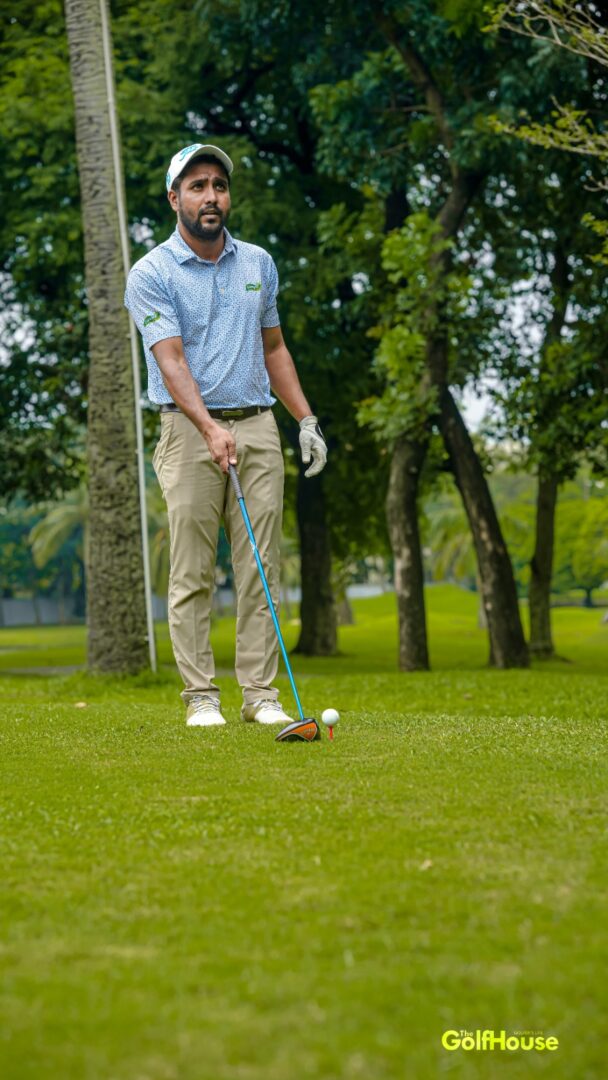
How did your last tournament go?
A: My most recent tournament was the Classic Open in Delhi, where I finished in the top five. What stood out for me was going bogey-free in the second and third rounds—a significant achievement in my career. I firmly believe that playing bogey-free and maintaining a fair-to-green strategy are crucial to doing well in tournaments.
How are you gearing up for the upcoming PGTI Tournament?
Unfortunately, we haven’t had any tournaments in the past three months, so I’ve been focusing on refining my game, especially in areas where I struggled during the PGTI. I had three events scheduled at home this month, but they were canceled due to the situation in the country. With PGTI events lined up from September to December, I’m currently awaiting my Indian visa. We’ll see how things unfold.
What are the main challenges that professional golfers in Bangladesh face?
The biggest challenge we face is obtaining foreign visas, largely because golf isn’t a widely recognized sport in Bangladesh. This often causes us to miss out on international events. Another significant issue is the lack of sponsorship. I’ve been lucky to have Paragon as my sponsor for the past eight years, but many professional golfers aren’t as fortunate.
If the top 10 golfers in the country were provided with sponsorships and didn’t face visa issues, I believe we could significantly elevate the status of golf in Bangladesh.
What are your goals for the next few years?
In the near term, my focus is on continuing to play on the Indian circuit for the next two years, after which I hope to qualify for the Asian Tour. My ultimate dream is to compete in Europe and, one day, the US PGA Tour.
What has been the most memorable moment of your golfing career?
Winning the Bangladesh Amateur Championship in 2016 and 2017 were proud moments for me. After my second win, someone mentioned that if I could achieve a hattrick, I’d receive a gold trophy. This motivated me to delay turning professional just so I could compete for that third win.
On the final day, I was leading the tournament through 16 holes. But on the 17th, I made a mistake—my shot went into the water. I had to drop a shot and eventually finished second. After the tournament, I was so devastated that I went to the washroom and cried for half an hour. Even during the dinner event later, I couldn’t shake off the disappointment. The pain of not winning that hattrick still lingers.
How important is mental strength in golf, and how do you work on yours?
Mental strength is absolutely crucial in golf, perhaps more so than in any other sport. Unlike other sports, where you’re constantly moving, golf requires you to stay focused for extended periods, sometimes over several hours. The ability to stay calm, make strategic decisions, and not let mistakes affect the rest of your game is essential. To build my mental strength, I practice mindfulness and meditation regularly. These practices help me stay centered and focused, especially during high-pressure situations in tournaments. Additionally, I try to keep a positive mindset, always focusing on the next shot rather than dwelling on past mistakes.
Which

golfer do you admire the most, and what aspects of their game inspire you?
Tiger Woods is my favorite golfer. I’m inspired by his aggressive and precise approach, especially when he finds himself in difficult situations, like when his shot lands in the rough or in the bushes. Most players would opt for a safe shot in those scenarios, but not Tiger—he always plays with boldness. Before I head out to the course, I often watch videos of Tiger Woods for about 10 minutes t
o get in the right mindset.
Locally, I’ve always admired Siddikur Bhai. He’s the reason many of us have dared to dream of becoming professional golfe
rs, and it’s because of him that we are where we are today.
Do you have any advice for those interested in taking up golf but don’t know where to start?
There are over 20 golf clubs across Bangladesh, spread out in various regions. Some of these clubs offer memberships at relatively affordable rates. If you think golf is too expensive, reach out to these clubs—they’re usually very supportive. But the first step is to decide that you truly want to pursue golf. Once you become a professional, you can even make a living from the sport. So, I’d encourage everyone to get involved, support the game, and help it grow.
